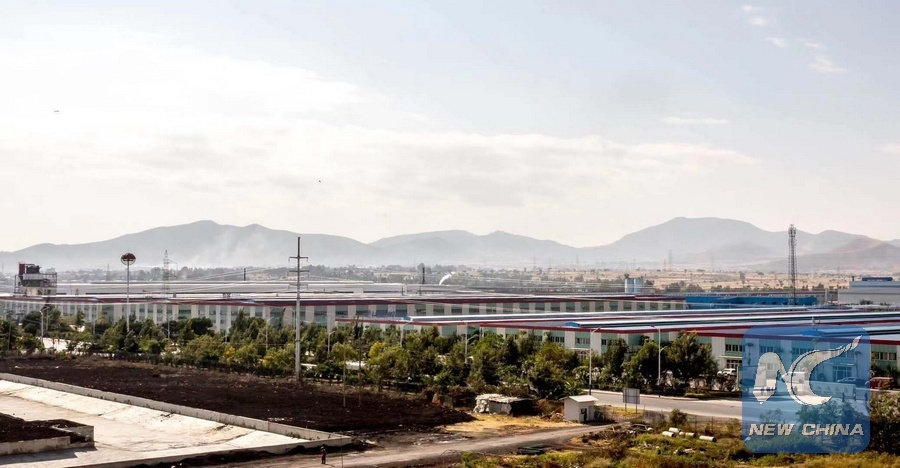
Photo taken on Dec. 7, 2018 shows the factories inside the Eastern Industrial Zone (EIZ) in the south of Addis Ababa, Ethiopia. (Xinhua/Zhang Yu)
ADDIS ABABA, May 28 (Xinhua) -- Ethiopia's Chinese-built Kilinto Industrial Park (KIP) has boosted the country's ambition to lure experienced international pharmaceutical companies across the globe.
The Ethiopian Investment Commission (EIC) on Monday revealed the signing of investment agreements with 10 international companies that have "shown great interest" to set up their industrial plants inside the premises of KIP.
EIC stressed that the industrial park, once fully finalized, will power the East African country's potential to attract more foreign companies in the pharmaceutical sector.
"The Kilinto Industrial Park is now on the verge of completion, and once completed it will host more than 1,000 pharmaceutical companies," EIC Deputy Commissioner Temesgen Telahun was quoted as saying by Ethiopia's state media Fana Broadcasting Corporate (FBC) on Monday.
Lying on 270-hectares of land on the outskirts of Ethiopia's capital Addis Ababa, the Kilinto Industrial Park is under construction by Chinese construction giant, Tiesiju Civil Engineering Group Co., Ltd. (CTCEGCL), at a cost of 204 million U.S. dollars.
The industrial park, which is fully financed by the World Bank, features 18-km of asphalt road, provision of basic social services, green spaces, warehouses, business centers and car parking space, according to the Ethiopian Industry Parks Development Corporation (IPDC).
IPDC officials had recently disclosed the Ethiopian government's plan to commission the Kilinto industrial park for interested and experienced pharmaceutical companies as of June this year.
Adenan Bere, Communications Director at the IPDC, told Xinhua recently that the East African country expects the KIP, which is under construction exclusively for pharmaceutical firms, to lure world-class companies with a view to help Ethiopia's economy through the export of pharmaceutical products as well as import-substitution.
Bere also noted that in addition to attracting foreign firms to penetrate Ethiopia's emerging pharmaceutical sector, the IPDC is also working with local financial institutions to support local firms to invest in the industrial park.
As the Ethiopian government in recent years embarked on attracting foreign firms in the pharmaceutical sector, Chinese firms are becoming among the major foreign firms in exerting their capital and technology in the sector.
In June last year, Chinese pharmaceutical giant, Sansheng Pharmaceuticals Plc, had inaugurated its production plant in Ethiopia amid Ethiopia's higher demand for import substitution in medicines.
Sansheng Pharmaceuticals Plc commenced its first phase of production in June 2018 inside the premises of the Eastern Industry Zone on the outskirt of Ethiopia's capital.
The Ethiopian government, which has been expressing its concern over the minimal share of local medical drugs production for the country's domestic use, also stressed the benefits of the Chinese pharmaceutical firm in saving large amount of hard currency through import substitution.
Demeke Mekonnen, Deputy Prime Minister of Ethiopia, said during the plant's inauguration ceremony that despite the Ethiopian government's various measures to support the pharmaceutical sector, the "sector has not yet evolved into where we projected it to be -- both in terms of its investment portfolio, production capacity, technology acquisition and the creation of employment opportunities."
He also noted that the sector is still dominated by heavy importation of pharmaceutical products from abroad, which currently represents about 85 percent of the annual 500 million U.S. dollar local market.
"Your investment to Ethiopia could not have come at a more opportune moment," Mekonnen said.
Ethiopia is currently constructing or has commissioned 15 industrial parks as part of a plan to turn the country into a light manufacturing hub in Africa by 2020.
Chinese companies, which are the leading partners of the Ethiopian government in the construction of industrial parks across the country, are also actively engaging their capital and technologies by investing inside the newly built industrial parks.
Ethiopia had licensed around 1,294 Chinese investment projects during the previous 2017/18 Ethiopian Fiscal Year that ended July 7, constituting around 25 percent of all Foreign Direct Investment to the east African country.

